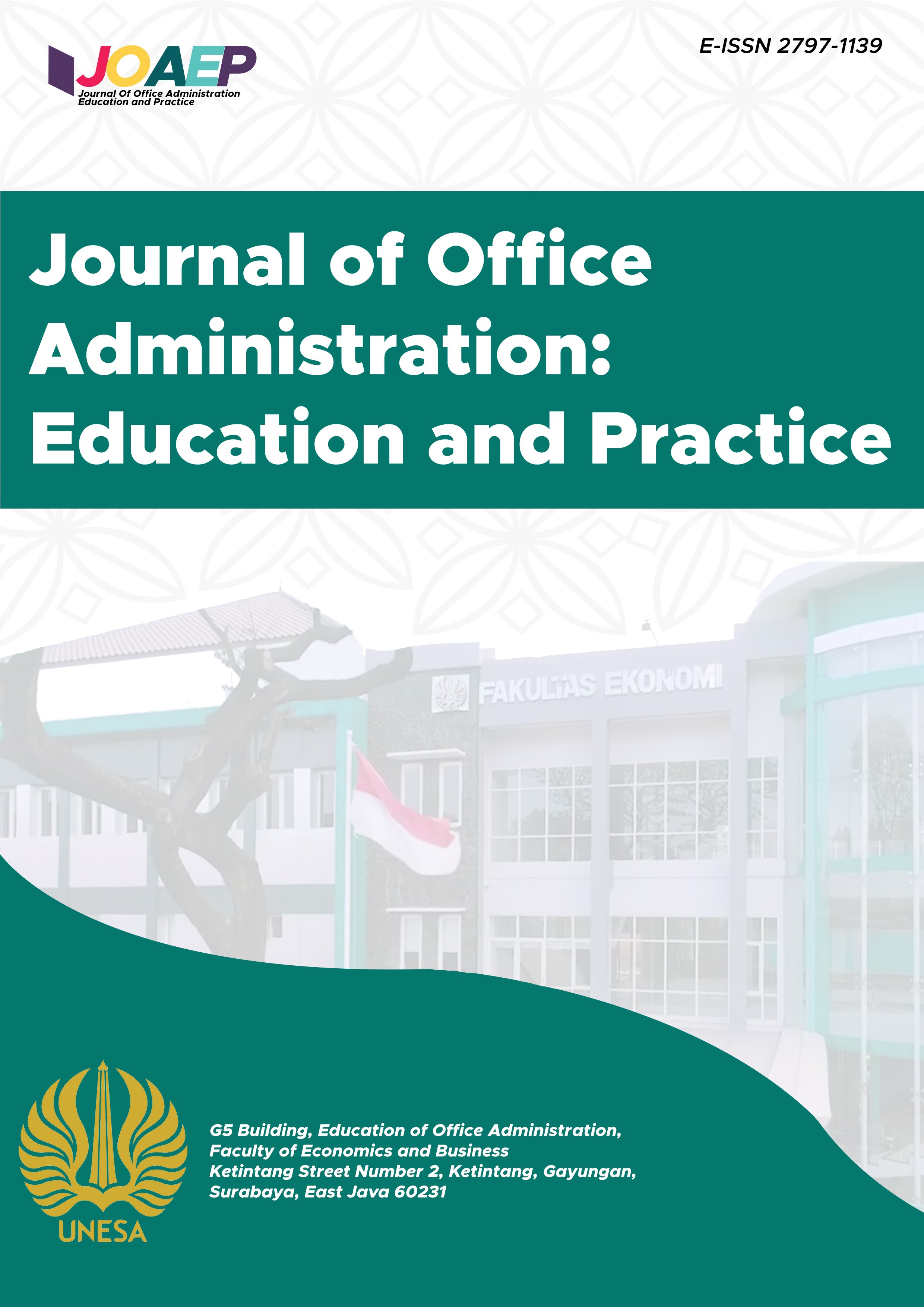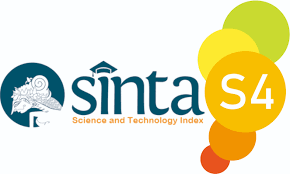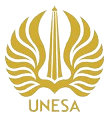Construct Validity of Non-Test Instrument for Problem-Based Learning Method
DOI:
https://doi.org/10.26740/joaep.v4n1.p1-9Keywords:
Non-Test Instrument, Problem-Based Learning, Construct Validity, Expert JudgementAbstract
This study aims to examine how the process of problem-based learning emphasizes creativity, cooperative learning, critical thinking, and idea development. The instruments used in these assessments cannot reflect the principles inherent in the problem-based learning method, which prioritizes contextual and daily-life applications. The objectives of this study aim to validate the developed product using ADDIE model, focusing on the outcomes of assessments by instrument and learning evaluation experts. The results of this study showed that the assessment instrument was categorized as very feasible by experts with an average score of 4.59 of 5 as maximum score. The learning evaluation expert assessment score was 4.71, and the instrument expert assessment was 4.47. Thus, it can be stated that the products developed are valid and suitable for use by target group. Valid and feasible instruments are expected to provide more accurate student learning assessment results according to learning objectives.
Downloads
References
Amir, M. T. (2009). Inovasi Pendidikan Melalui Problem Based Learning. Kencana Perdana Media Group.
Arlinwibowo, J., Mustaqim, Y., Prihandono, A., Maisa, F., Ridwan, A., & Himayati, A. I. A. (2021). Developing Mathematical Exercise Software for Visually Impaired Students. Psychology, Evaluation, and Technology in Educational Research, 3(2), 77–88. https://doi.org/doi.org/10.33292/petier.v3i2.81
Arlinwibowo, J., & Retnawati, H. (2015). Developing Audio Tactile for Visually Impaired Students. International Journal on New Trends in Education and Their Implications, 6(4), 18–30.
Arlinwibowo, J., Retnawati, H., Kartowagiran, B., & Kassymova, G. K. (2020). Distance learning policy in Indonesia for facing pandemic COVID-19: School reaction and lesson plans. Journal of Theoretical and Applied Information Technology, 98(14), 2828–2838.
Bogdan, B. C., & Bilken, S. K. (2007). Quality research for education: An introduction to theory and methods. Pearson.
Djamas, D., Tinedi, V., & Yohandri. (2018). Development of Interactive Multimedia Learning Materials for Improving Critical Thinking Skills. International Journal of Information and Communication Technology Education, 14(4), 66–84. https://doi.org/10.4018/IJICTE.2018100105
Febriana, F. D., & Sakti, N. C. (2021). Pengembangan E-Modul berbasis Kontekstual sebagai Pendukung Pembelajaran Jarak Jauh Kelas X IPS. Jurnal PROFIT: Kajian Pendidikan Ekonomi Dan Ilmu Ekonomi Kajian Pendidikan Ekonomi Dan Ilmu Ekonomi, 8(1), 47–58. https://doi.org/10.36706/jp.v8i1.14057
FH, Y., Fatimah, S., & Barlian, I. (2021). Pengembangan Bahan Ajar Digital Interaktif dengan Pendekatan Kontekstual pada Mata Kuliah Teori Ekonomi Mikro. Jurnal PROFIT: Kajian Pendidikan Ekonomi Dan Ilmu Ekonomi, 8(1), 36–46. https://doi.org/10.36706/jp.v8i1.13875
Fogarty, R. (1997). Problem-Based Learning and Other Curriculum Models for the Multiple Intelligences Classroom. Hawker Brownlow Education.
Godwin, A., Potvin, G., Scott, T. D., Sonnert, G., & Sadler, P. M. (2015). The Academic Performance Index: Creating a More Robust and Less Biased Measure of Student Academic Performance. 2015 IEEE Frontiers in Education Conference (FIE). https://doi.org/10.31539/joeai.v4i1.2151
Hermanto, F. Y., Sutirman, Hidayati, B., & Sholikah, M. (2019). The Need of Practical Teaching in Vocational High School of Automation and Office Management Program in Yogyakarta City. Jurnal Pendidikan Vokasi, 9(3), 238–248. https://doi.org/10.21831/jpv.v9i3.26734
Hermanto, F. Y., Wulandari, S. S., Muyassaroh, J., & Hidayati, B. (2022). Validitas Modul Praktik Perkantoran Menggunakan Metode Pembelajaran Role-Playing berbasis Kebutuhan Industri. Jurnal PROFIT: Kajian Pendidikan Ekonomi Dan Ilmu Ekonomi, 9(2), 103–111. https://doi.org/10.36706/jp.v9i2.19014
Hmelo-Silver, C. E. (2004). Problem-Based Learning: What and How Do Students Learn? Educational Psychology Review, 16(3), 235–266.
Ibrahim, M., & Nur, M. (2000). Pengajaran Berdasarkan Masalah. Unesa University Press.
Kristanto, S. A., Harti, Wulandari, S. S., & Patrikha, F. D. (2021). Pengembangan Media Pembelajaran Menggunakan Lectora Inspire pada Mata Kuliah Salesmanship. Jurnal PROFIT: Kajian Pendidikan Ekonomi Dan Ilmu Ekonomi, 8(2), 84–94. https://doi.org/doi.org/10.36706/jp.v8i2.14417
Ramadhan, R. H. (2019). Pengembangan Komik Fisika berbasis Kearifan Lokal Long Bumbung Berbantu Android untuk Meningkatkan Kemampuan Representasi Fisis dan HOTS Peserta Didik Sma pada Materi Bunyi. Universitas Negeri Surabaya.
Rasyid, Harun, & Mansur. (2007). Penilaian Hasil Belajar. CV. Wacana Prima.
Rusman. (2014). Penerapan Pembelajaran Berbasis Masalah. Edutech, 1(2), 211–230.
Saputri, A., Sukirno, Kurniawan, H., & Probowasito, T. (2020). Developing Android Game-Based Learning Media “Go Accounting” in Accounting Learning. Indonesian Journal on Learning and Advanced Education (IJOLAE), 2(2), 91–99. https://doi.org/10.23917/ijolae.v2i2.9998
Saputro, M. N. A., & Pakpahan, P. L. (2021). Mengukur Keefektifan Teori Konstruktivisme dalam Pembelajaran. JOEAI (Journal of Education and Instruction), 4(1), 24–39. https://doi.org/doi.org/10.31539/joeai.v4i1.2151
Susanti, N., Ramayani, C., Yulhendri, Y., & Evanita, S. (2019). Validation in the Development of Cost Accounting Practicum Module of Guided Discovery Methods. Dinamika Pendidikan, 14(1), 26–36. https://doi.org/10.15294/dp.v14i1.18053
Suyadi. (2013). Strategi Pembelajaran Pendidikan Karakter. PT. Remaja Rosdakarya.
Vagias, W. M. (2006). Likert-type scale response anchors. In Clemson International Institute for Tourism & Research Development, Department of Parks, Recreation and Tourism Management.
Vandenhouten, C., Groessl, J., & Levintova, E. (2017). How Do You Use Problem-Based Learning to Improve Interdisciplinary Thinking? New Directions for Teaching and Learning, 151, 117–133. https://doi.org/10.1002/tl.20252
Widianingrum, R., Suranto, Hermanto, F. Y., & Sholikah, M. (2020). Office Communication Competencies for Vocational High School in Industri 4.0. Dinamika Pendidikan, 15(1), 77–86. https://doi.org/10.15294/dp.v15i1.24348
Winarno, S., Muthu, K. S., & Ling, L. S. (2018). Direct Problem-Based Learning (DPBL): A Framework for Integrating Direct Instruction and Problem-Based Learning Approach. International Education Studies, 11(1), 119–126. https://doi.org/10.5539/ies.v11n1p119
Downloads
Published
How to Cite
Issue
Section
 Abstract views: 249
,
Abstract views: 249
, PDF Downloads: 134
PDF Downloads: 134











